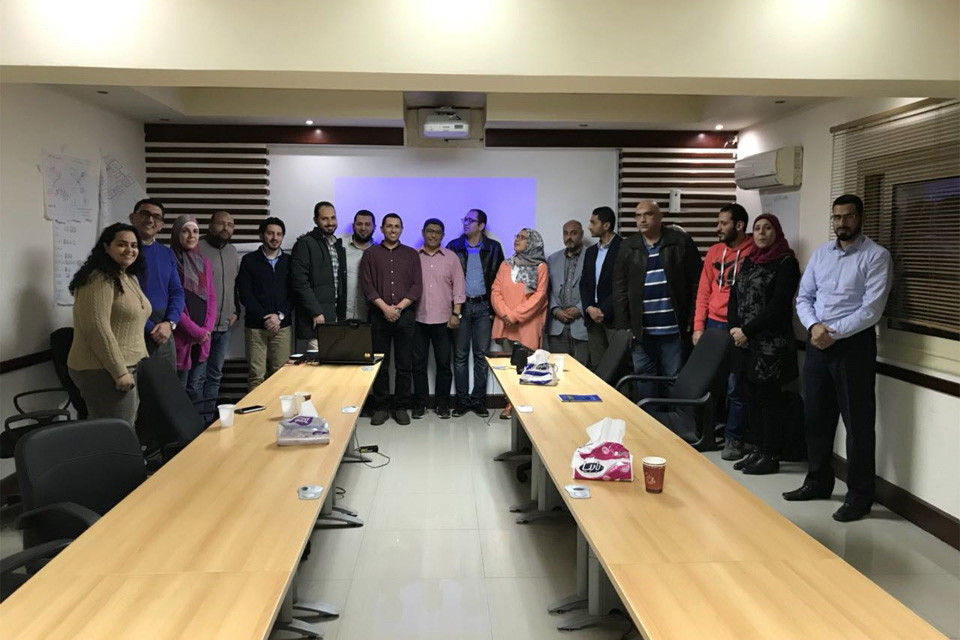|
Industry 4.0
|
Having new members joining our monthly meetings is a great pride for us as it’s an indicator of our community getting bigger especially this meeting we enjoyed groups from different companies. We have been using different platforms to promote our activities and announce topics of our meetings. In this meeting Sherief Maged and Bassem Hussein are talking about the IOT and how it’s being already implemented in the largest companies. Many companies has started to implement the IOT in their systems to provide fast and efficient service to their clients, From these companies: Etsy: one of the largest online shops that buys handmade and vintage items the company recently has implemented the IOT in order to prototype and test the features of the items that is being sold. The program was launched in 2011, and there are now 50,000 active users testing prototypes. Etsy Prototypes keeps developers, designers, product managers, and users constantly in contact. Users connect and receive feedback quickly through a forum. Designers and developers use a process similar to the "agile management" used in app production to ship their latest versions. This includes a “living style guide,” in which designers bypass ordinary wireframes and select from existing code segments to build functional interfaces very quickly. •Spotify: which is the largest digital music service that gives you access for thousands of the songs. Spotify encourages finding ways to ensure fast failure recovery rather than simply avoid failing at all. Some squads even use a fail wall where they publicly share their failures and whenever there is a failure, the squad conducts post-mortems and retrospectives which allows it to capture any learnings from the experience. In order to remove the shame and stigma of failure and encourage experimentation, Spotify hosts several experimentation weeks, where people spend time building whatever strikes their fancy and then showcasing to their colleagues at the end of the event. Besides removing fear, experimentation also promotes a data-driven approach to taking decisions, rather than having decisions taken on the basis of personal opinion, ego or authority. Netflix: the online watch and stream videos online has implemented the IOT in a way that tests the end to end culture. Netflix tests everything their offerings, pricing, advertisement, and reliability. Netflix's John Ciancutti says the best way to avoid failure is to fail constantly. Netflix aggressively moves this strategy into the cloud by randomly failing servers using a tool they built called Chaos Monkey. They believe that rigorous testing is the key to success. Impacts related to downtime may include loss of revenue or e-commerce sales, regulatory fines for downtime or deadlines missed, customer compensation, reputation damage, lost productivity for employees and so on. If organizations are not integrating resiliency into their initial system / cloud adoption, they are accepting risks, whether they realize it or not. Industrial revolution The industrial revolution passed through 4 stages First Stage: Based on the introduction of mechanical production equipment driven by water and steam power Second stage: based on mass production achieved by division of labor concept and the use of electrical energy Third Stage: based on the use of electronics and IT to further automate production. Fourth Stage: based on the use of cyber-physical systems Enabling the 4th Industrial revloution Cyber Physical Systems (CPS) new generations of engineered systems integrated physical systems and processes with networked computing an cyber modules. Industry 4.0 smarter factories to value chains Industry 4.0 talks about the concept of “Smart Factories”. These are factories in which all equipment and machineries would be monitored by cyber-physical components. This means you would no longer require field engineers to go around every hour monitoring the equipment. Sensors will do that for you and send signals, as often as required, to a centralized control system, which can process and monitor those signals. Automating the monitoring part implies that there will be no misses or human errors in identifying issues. A shift to smart manufacturing ensures that businesses save much money and translate into greater profits, along with producing more jobs and healthier economies. Our machines are moving into a more complex age, so are our workers and products, ushering in a new era of production. There is a necessity to capitalize on smart manufacturing as it is considered to be a strategic asset for growth. This is the age of re-imagining the future of smart manufacturing with digital factories.
|

